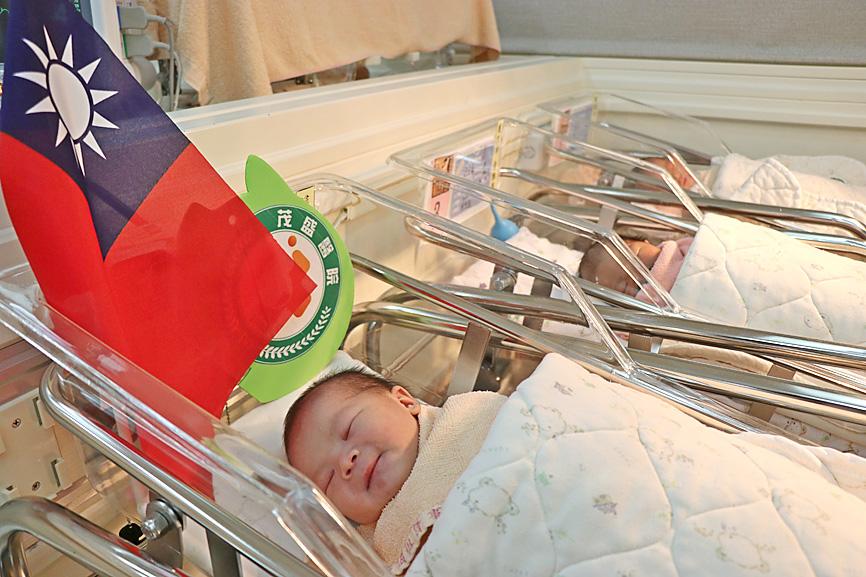A year after expanding the financial subsidy for assisted fertility services and limiting the maximum number of embryos implanted, the success rate of single-embryo transfer (SET) and double embryo transfer (DET) procedures for in vitro fertilization (IVF) has increased from 72.7 percent to 93.9 percent, the Health Promotion Administration (HPA) said.
A physician described the subsidy expansion program and related policy as a “silent revolution,” as it has not only changed medical behavior, but enabled assisted fertility services using precision medicine to rapidly expand and develop.
The policy stipulates that women aged 35 or under can only undergo SET, while women older than 35 can choose a SET or a DET procedure.

Photo: Tsai Shu-yuan, Taipei Times
Based on preimplantation genetic testing for aneuploidy — a technique used to analyze the number of chromosomes present in IVF embryos — the rate of normal blastocyst formation on the fifth day after fertilization in 40-year-old women is 48 to 54 percent, which means the SET success rate is about 50 percent, Fertility Society of the Republic of China chairman and clinical gynecologist Chang Fan (張帆) said.
Therefore, performing a DET can increase the success rate, although when more than one embryo is planted, the chance of giving birth to twins increases, he said.
In the past, people often asked for more embryos to be implanted to increase the success rate of a single IVF procedure, so the rate of multiple births for IVF pregnancies was about 24.1 percent in 2019, HPA data showed.
Lai Tsung-Hsuan (賴宗炫), director of Cathay General Hospital’s Assisted Reproductive Center, said the rate of multiple births in IVF pregnancies is lower than 10 percent in some Western countries — a goal that Taiwan is trying to achieve.
To effectively reduce the risk of multiple births while increasing the rate of pregnancy, artificial intelligence technology is used to select the best embryo for transfer, such as the time-lapse embryo culture system, preimplantation genetic screening and endometrial receptivity analysis, Lai said, adding that these precision methods have increased the IVF success rate.
However, these methods are not included in the HPA’s financial subsidy program, so people must ask their doctor whether they are recommended, he said, adding that they are usually suggested for older women and women with repeated embryo implantation failures, as well as men with serious male infertility conditions.
As of Monday last week, 42,642 cases have been approved for the HPA’s financial subsidy for assisted fertility services since it was expanded in July last year, HPA figures showed.
Among them, 28,139 cases have completed the IVF procedure and passed the subsidy review, receiving a total of more than NT$1.97 billion (US$65.79 million), and 2,318 couples have given birth to 2,604 babies.
The average age of first-time mothers was 31.23 last year, up from 31.09 in 2020, and women of an advanced maternal age (35 years or older) accounted for 31.64 percent of last year’s pregnancies.
Taiwanese Society for Reproductive Medicine secretary-general Ho Hsin-i (何信頤) said people might see public figures become pregnant at an advanced maternal age and assume that they can freeze their eggs first and rely on IVF later.
However, according to the HPA’s IVF data, the live birth rate per embryo transferred is nearly 50 percent in women aged 35 or under, and less than 20 percent in women aged 41 or older, he said.
The HPA also encourages married couples to make birth plans and try to give birth earlier at childbearing age, as the risks of complications increase with age.

POSITIVE DEVELOPMENT: Japan and the US are expected to hold in-depth discussions on Taiwan-related issues during the meeting next month, Japanese sources said The holding of a Japan-US leaders’ meeting ahead of US President Donald Trump’s visit to China is positive news for Taiwan, former Japan-Taiwan Exchange Association representative Hiroyasu Izumi said yesterday. After the Liberal Democratic Party’s landslide victory in Japan’s House of Representatives election, Japanese Prime Minister Sanae Takaichi is scheduled to visit the US next month, where she is to meet with Trump ahead of the US president’s planned visit to China from March 31 to April 2 for a meeting with Chinese President Xi Jinping (習近平). Japan and the US are expected to hold in-depth discussions on Taiwan-related issues during the

‘LIKE-MINDED PARTNER’: Tako van Popta said it would be inappropriate to delay signing the deal with Taiwan because of China, adding he would promote the issue Canadian senators have stressed Taiwan’s importance for international trade and expressed enthusiasm for ensuring the Taiwan-Canada trade cooperation framework agreement is implemented this year. Representative to Canada Harry Tseng (曾厚仁) in an interview with the Central News Agency (CNA) said he was increasingly uneasy about Ottawa’s delays in signing the agreement, especially as Ottawa has warmed toward Beijing. There are “no negotiations left. Not only [is it] initialed, we have three versions of the text ready: English, French and Mandarin,” Tseng said. “That tells you how close we are to the final signature.” Tseng said that he hoped Canadian Prime Minister Mark Carney

President William Lai (賴清德) yesterday bestowed one of Taiwan’s highest honors on Saint Vincent and the Grenadines (SVG) Ambassador Andrea Clare Bowman in recognition of her contributions to bilateral ties. “By conferring the Order of Brilliant Star with Grand Cordon on Ambassador Bowman today, I want to sincerely thank her, on behalf of the Taiwanese people, for her outstanding contribution to deepening diplomatic ties between Taiwan and SVG,” Lai said at a ceremony held at the Presidential Office in Taipei. He noted that Bowman became SVG’s first ambassador to Taiwan in 2019 and

A man walks past elementary school artworks at the Taipei Lantern Festival in Ximen District yesterday, the first day of the event. The festival is to run from 5pm to 10pm through March 15.